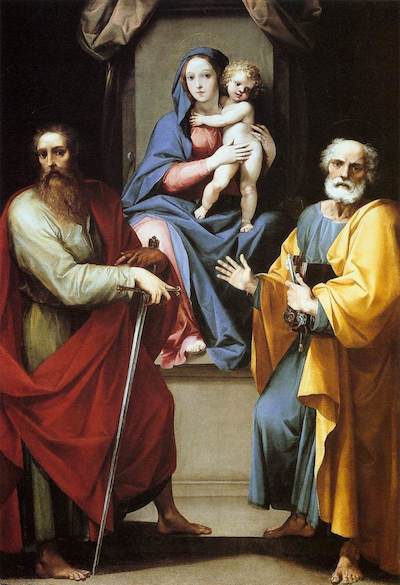 For the Second Sunday of Lent, all three readings follow the same thought that, perhaps, can be expressed in this way: faith is a journey we are all on, a journey of joy, a journey that demands sacrifice, and a journey that leads to glory.
For the Second Sunday of Lent, all three readings follow the same thought that, perhaps, can be expressed in this way: faith is a journey we are all on, a journey of joy, a journey that demands sacrifice, and a journey that leads to glory.
Faith is a journey. That’s a strange statement. Perhaps you might say, “I thought faith was the sum total of the things that you believe.” No, faith is much more than that. Faith is the way that we live reflecting our beliefs.
Faith is a journey. It is a journey of joy as we grow in the realization that we are happy when we are united to God. We are given a small portion of the joy that God has for us when we recognize His Presence and His working in our lives. When we live our faith we are happy with ourselves. Faith is a journey of joy as we experience others coming to the Lord, particularly our young, but all others who find Christ.
In the Book of Genesis (12:1-4) we are presented with the journey of Abram, the patriarch whom God would later name Abraham. Abram was 75 years old when God called him to make a journey of faith. He called him out of Ur, possibly in present day Iraq. He called Abram to leave his kinfolk, but he promised him that if he makes this sacrifice, he would make of Abram a great nation. Out of faith Abram began the journey. It was not an easy journey that Abram went on. He was stuck with his difficult nephew Lot. Lot was a lot of trouble. He was selfish. Abram had to learn how to deal with him. Abram also had to survive a stay in Egypt. That was the strange story of Genesis 12. Abram brought his people to Egypt to escape a famine, but had to deal shrewdly with the Pharaoh in order to avoid being killed. After the famine he led the people out of Egypt but then had to deal with the various nations who wanted to keep him from moving his people onto what they perceived was their territories. His faith was challenged over and over, culminating in the supreme challenge when he was told to sacrifice his son Isaac. Abram did not allow his faith to waiver. Each time he was challenged he took another step of faith in his unseen God. Abrams life is a journey of faith. Abraham is the Father of Faith, the Father of the Chosen people.
In St. Paul’s Letter to Timothy (1:8-10), Paul tells Timothy that his own journey of faith demands bearing with, and he uses this expression, “the hardship that the gospel entails.” By gospel Paul is referring not just to the sections of the New Testament that the priest or deacon reads, but to the whole new way of living demanded by following Christ. The word gospel, means good news, it refers to the joy that has come into the world and into each of our lives, the joy of Jesus Christ. But, Paul says, this gospel, this new way of living, brings upon itself hardship. Why? Well, God demands that we make His Life a priority in our lives. He calls upon his people to be holy, that is, to be separate. That means that we have to live according to principles of faith and morality which might be very different than the so called modern way of living.
Many times people are edified by those who live their faith and, as a result, these people change their own lifestyles so they also can be people of faith. That is part of the joy of the journey, there are always new people joining us on our walk. But, sadly, sometimes people are intimidated by people of faith. Some do their best to attack us. In Paul’s time, that attack was physical. In our time, that attack is both intellectual and psychological. So we may hear, “You Catholics are leftovers from a past that reasonable people have rejected.” That is not true. The greatest intellects in history have embraced their Catholic faith such as Augustin, Aquinas, Anselm and Albert, and that is just a few of the “A’s.” Some great minds who were not Catholic, such as John Henry Newman, have sincerely sought out truth and embraced the Catholic faith. We know who we are. We know the happiness we have when we live the life of the Lord. Satan wages spiritual warfare on us by tempting us to think that we are somehow less than we could be because we refuse to embrace the immoral aspects of society. We would rather choose Christ and be happy than choose immorality and be desperate for love. It is true, though, our journey of faith will always bring hardships from others, but then again we are following the One who leads us to Calvary.
It is in this vein that we can understand the importance of the Gospel reading (Mt 17:1-9), the Transfiguration of the Lord. Jesus meets with Moses and Elijah. Moses represented the Law; Elijah, the Prophets. They were the main figures in Hebrew Scriptures, the Old Testament. They met with Jesus to discuss how the Word of God was going to bring God’s Word to its fulfillment. The disciples witness the glory of God. They were ecstatic. They were given a glimpse of their deepest hope, that Jesus was Lord. But then they were told that they need to be quiet about this until after the death of the Lord. Jesus’ glory cannot be understood apart from His sacrifice.
The concept of only recognizing glory when it is a result of sacrifice is not that extraordinary. We do this all the time. No one honors someone who was just lucky, say in purchasing a winning lottery ticket. But a person is honored when his or her success is the result of hard work. His or her glory is due to his or her sacrifice. The athlete is honored not just for the event, but for the training and sacrifice that gave her or him the ability to perform. You reward your children not just for the good grades on their report cards, but also for the sacrifice and hard work that led to those grades. In the same way, those of you who have celebrated your 50th wedding anniversaries, God bless you, are honored not just because you hung in their for so long, but because your sacrificed for each other so well.
Faith demands that we make that joyful journey from sacrifice to glory. It demands that we separate ourselves from our own selfish desires in order to give to others. This is the path to glory for a Christian. And it is a path full of joy. We Christians are happy because, like the disciples on the mountain of the transfiguration, we have experienced a touch of heaven, the joy of the Lord, the happiness that is to come.
Faith is not just something we profess. Faith is a life that we lead. It is a life of joy, a life of sacrifice, and a life leading us to the Glory of God.








